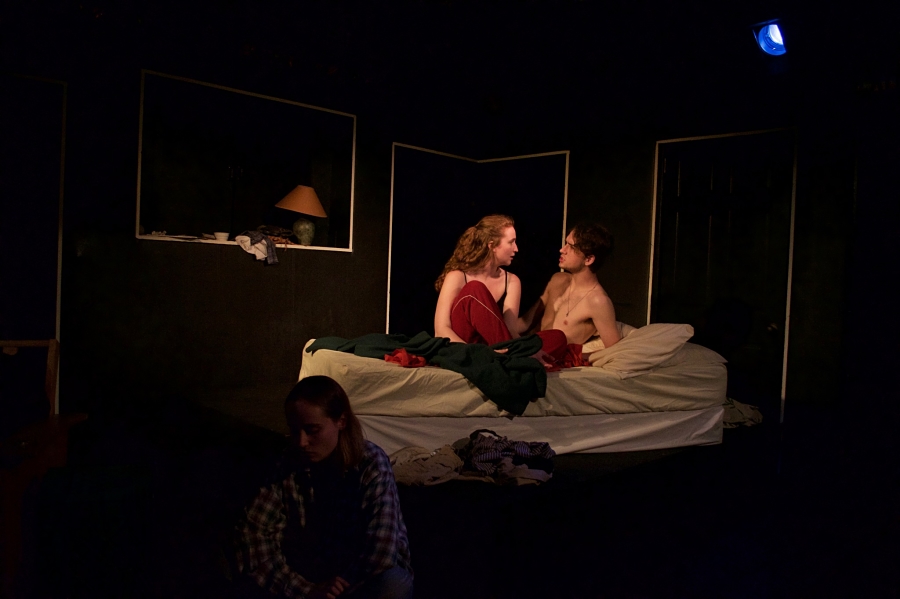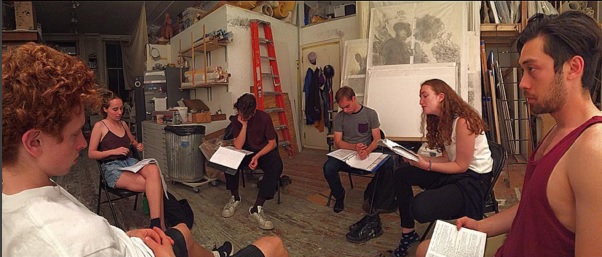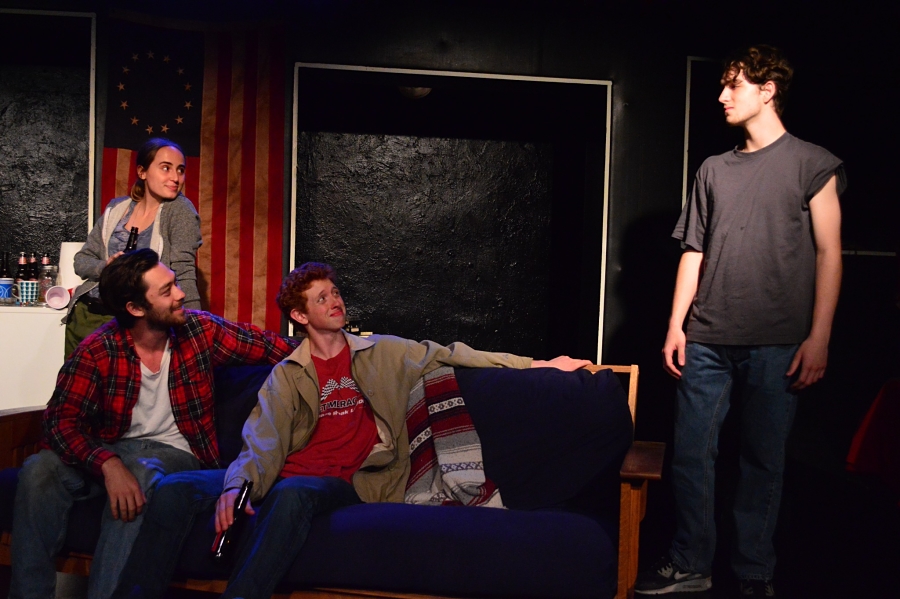“To know somebody from age 14 to age 20 is to see them go through hell and come back.”
Niall Cunningham is talking about his high school experience at Fiorello H. LaGuardia High School in New York City. A few months after graduation in 2014, he remembers, he received a call from his fellow classmate Michael Herwitz, who had the idea to start a theatre company. Now the company has more than 25 ensemble members, and is producing Lucy Thurber’s Where We’re Born, July 15-23, at the Flea Theater in New York City.
When Cunningham received the fateful phone call a year and a half ago, he was studying at Tufts University (he’s now on a leave of absence), and Herwitz, a New York City native, was adjusting to life in Chicago, where he studies at Northwestern University. He was also getting acquainted with his first major theatre scene outside of New York, seeing shows at established Chicago theatre companies like Steppenwolf and Lookingglass.
“I was thinking, ‘Wow, there’s so much more to theatre than the Broadway/Off-Broadway hierarchy of New York,’” says Herwitz. Also, like any fresh-faced college student, he was going through some growing pains. “We had such a tight-knit crew in high school, and that community was so strong,” he adds. “When I left, it was really hard to find something similar.” His solution: Start a theatre company.
Herwitz and Cunningham, who both went to LaGuardia, an arts high school on New York’s Upper West Side, began reaching out to their high school peers. “We just started emailing people,” Cunningham recalls, “By December, we had our first meeting.”
The students were familiar with the idea of starting a company. Other LaGuardia students formed Young Gotham Arts a few years ago, and peers from Herwitz and Cunningham’s class recently founded Rascal Arts. Herwitz and Cunningham named their company G45 Productions after a classroom at LaGuardia, and took on the titles of executive director and artistic director, respectively.
G45’s first production was Paula Vogel’s How I Learned to Drive, a coproduction with Young Gotham Arts that ran at the Tank in Manhattan last summer. Now they’re midway through performances of Where We’re Born.

Set in rural Massachusetts, the play centers on a first-generation college student returning to her hometown after a semester at school; it has clear and obvious parallels to the company members’ own lives.
“It’s about people who are struggling to find where they belong” says Herwitz. The coming-of-age themes and themes of sexual self-discovery were “a personal thing for the people involved and a personal story for everybody,” adds Cunningham. “Our audiences are young too.”
In Where We’re Born, characters grapple with sexual identity and personal ambition, two issues very familiar to twentysomethings. For the ensemble members, Herwitz says, the experience of growing up together, with many being in the midst of a coming of age themselves, made these themes naturally accessible. “That’s one of the reasons that we’ve found a lot of heart in the play,” he says. The ensemble’s relatively long history also helped them feel instantly comfortable with one another and ready to address themes that hit close to home. “If you did this play with five strangers, the first three weeks would just be getting comfortable with each other,” Herwitz points out. “That was already done.”
The company does more than produce plays. During the summer, when ensemble members are home in the city from college, G45 gets together weekly for private play readings, which Cunningham affectionately refers to as “basement revivals.” These informal gatherings allow company members to meet new playwrights, and for the actors in the group, the readings present an opportunity to stretch beyond their types.
“People we know who are in college shows often feel like certain acting muscles aren’t being accessed,” Cunningham explains. “They want to play whatever role they’ve read at the Drama Book Shop, so it’s like a little fantasy lived out.” He gives an example: “We did a reading of Buried Child, and it was great to come in and have a discussion about Sam Shepard around somebody’s couch. It establishes that sense of community.”

The company has also done more formal public readings as part of their New Work Development Series, which stages readings of in-progress plays being developed by playwrights in their early twenties. Last month the company had a weeklong residency at IRT Theater, where they presented readings of Poplar and Rope/Melanin/Where you gonna run to? by Kori Alston, Sip//Crash by Sam Mueller, Here Be Monsters by India Kotis, and Black Ice by Max Friedlich.
Before the readings took place, the company hosted workshops and feedback sessions to help the playwrights develop their work. In this way, the company invites peers to teach each other by sharing knowledge that they’ve gained at their respective colleges and universities with the group at large. Despite their different college training experiences, the group shares a core connection. “Everyone speaks a similar language,” says Cunningham.
To finance the work, G45 has used crowdsourcing websites like Indiegogo and have also invested their own money, which they hope to recoup with ticket sales. “We’re scrounging,” Herwitz says. “If we don’t do well, then there are consequences. But that’s also really exciting. It allows us to be smart and economical. We don’t have money to throw at things, so if we’re going to spend money, we have to really know why.”
So what’s next for the company? Becoming a nonprofit, for one. “We’re not 501(c)(3) yet,” says Herwitz. “We hope to be in the coming years.” The company will continue to choose plays to produce that fit the ages and interests of the ensemble. “Right now, we have twenty-year-olds playing twenty-year-olds,” adds Herwitz.
While the company has ambitions of growing, they also make a point of appreciating what they’ve already done. “We’ve been so lucky that we’ve gotten to work with sweet, generous, hard-working, passionate people,” says Herwitz, “It doesn’t get any better than that, at any scale.”


